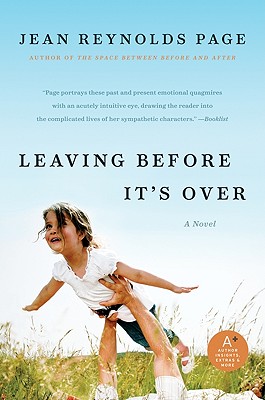In today's guest post Jean Reynolds Page, author of THE LAST SUMMER OF HER OTHER LIFE, THE SPACE BETWEEN BEFORE AND AFTER, A BLESSED EVENT, AND ACCIDENTAL HAPPINESS. talks about the challenges of being a stepparent and the challenges she faced in writing one in her latest novel LEAVING BEFORE IT'S OVER.
 Even under the best of circumstances, becoming a stepparent cannot be easy. That thought ran through my mind on more than one occasion during the months I spent writing LEAVING BEFORE IT’S OVER. The notion of my character Rosalind filling the role of stepmother to seventeen-year-old Luke is not the most obvious issue in the book. As book groups I attend often point out to me, my books tend to have complicated relationships all around, and Luke’s apparent paternity versus his real paternity takes center stage most of the time. But Rosalind’s struggle always kept the writing process lively.
Even under the best of circumstances, becoming a stepparent cannot be easy. That thought ran through my mind on more than one occasion during the months I spent writing LEAVING BEFORE IT’S OVER. The notion of my character Rosalind filling the role of stepmother to seventeen-year-old Luke is not the most obvious issue in the book. As book groups I attend often point out to me, my books tend to have complicated relationships all around, and Luke’s apparent paternity versus his real paternity takes center stage most of the time. But Rosalind’s struggle always kept the writing process lively.
The notion of dealing with this issue on a more in-depth level came when I was talking with book groups about ACCIDENTAL HAPPINESS several years ago. Discussions often came around to the way in which the main character Gina came to feel deep, motherly instincts toward Angel, the daughter of her husband’s ex-wife. This would spark broader discussions about the role of the stepparent and I found the complexity of emotion surrounding the topic to be both stimulating and moving.
Most people who find themselves parenting the children of a spouse, land in that position through a more conventional process than Rosalind. They marry someone with children who are part of the relationship from the beginning. Even then, I’m told the situation requires a tightrope negotiation of steps to establish a happy home.
So when wading into the muddied situation of Rosalind, Roy and Luke, I didn’t anticipate an easy writing experience. The surprise and the irony came with the realization that while Luke’s scenes came with minimal effort (a friend and early reader of the manuscript commented to me, “You must have been a teenage boy in a former life”), the most difficult by far were sections of the narrative from Rosalind’s point of view. Rosalind, the forty-something, happily married mother. I should have slipped into her skin without much trouble. But even in fiction, perhaps it is easier to put on a mask than to give up thoughts that might be closer to your own.
The truth is, Rosalind’s dilemma made me uncomfortable. What would I do if asked to offer my home to a resentful boy who regarded me as a stepmother? Could I overcome my own feelings of resentment and find empathy for how lost the boy must feel? Even in a less dramatic scenario, could I be selfless enough to be a successful stepparent? I would like to think so, but the difficulty it took to get to Rosalind’s true voice tells me the issue would certainly be complicated for me.
I finished writing the novel with a new appreciation for my stepparent friends who live a version of the stories that I merely write about. With this fresh on my mind, I ran into a friend who remarried when his daughter was in middle school. The story of his proposal underscored how rich the experience can be when things turn out right.
After long discussions with his daughter about a potential wedding, he bought a ring at Christmas. I forget the larger decoy present, but he bought one and tucked the small ring box inside. After his then girlfriend’s happy response to the first item, she found the ring box. Looking up, she was too stunned to speak and before my friend could say anything, his daughter piped in with, “He wants to know if you’ll marry us!”
While I try to resolve my books with realistic endings, I’m a sucker for happy ones.
-- Jean Reynolds Page, Author (www.jeanreynoldspage.com)

